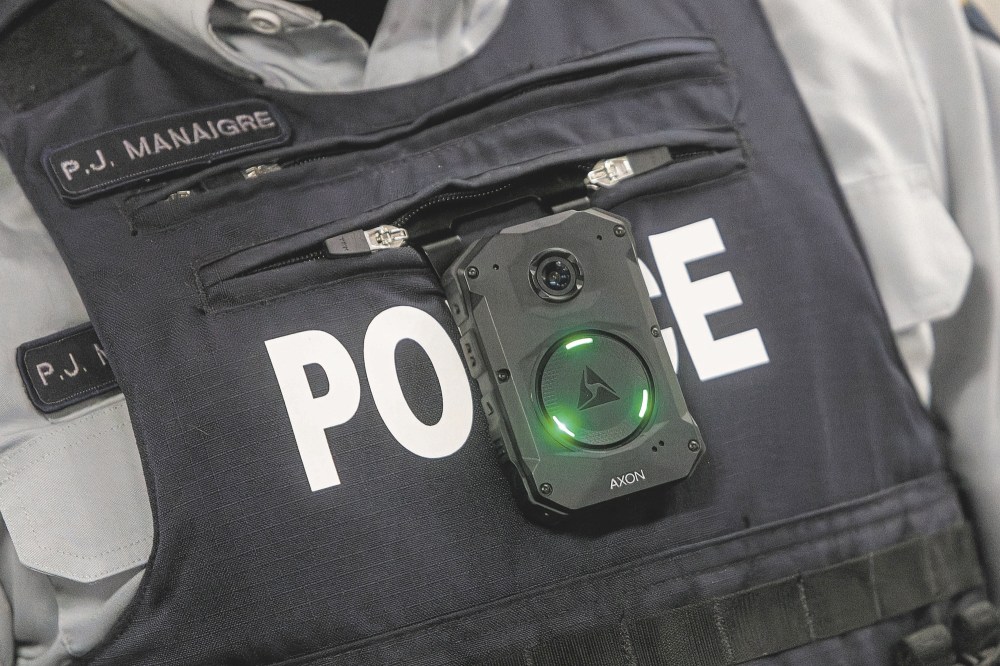Nearly all officers wearing body camera: RCMP
Advertisement
Read this article for free:
or
Already have an account? Log in here »
We need your support!
Local journalism needs your support!
As we navigate through unprecedented times, our journalists are working harder than ever to bring you the latest local updates to keep you safe and informed.
Now, more than ever, we need your support.
Starting at $15.99 plus taxes every four weeks you can access your Brandon Sun online and full access to all content as it appears on our website.
Subscribe Nowor call circulation directly at (204) 727-0527.
Your pledge helps to ensure we provide the news that matters most to your community!
To continue reading, please subscribe:
Add Brandon Sun access to your Free Press subscription for only an additional
$1 for the first 4 weeks*
*Your next subscription payment will increase by $1.00 and you will be charged $20.00 plus GST for four weeks. After four weeks, your payment will increase to $24.00 plus GST every four weeks.
Read unlimited articles for free today:
or
Already have an account? Log in here »
Nearly all of Manitoba’s front-line RCMP officers have been equipped with body cameras, the police service announced on Thursday.
The RCMP said 638 body cameras — accounting for 98 per cent of front-line officers across the province — have been outfitted, just over a year after the rollout was announced.
“Without a doubt, they have quickly become an incredible and beneficial and important tool for all of our officers,” RCMP Assistant Commissioner Scott McMurchy told reporters at a press conference in Winnipeg.

The body cameras, which are placed on an officer’s chest, allow for video to be taken during traffic stops, arrests and while officers work in the community.
The last round of body cameras will be deployed in Berens River, where a new detachment is opening next week.
Brandon RCMP officers received their body cameras in late February, media relations officer Michelle Lissel said in an email to the Sun.
Last December, Brandon Police Service Chief Tyler Bates said the force intended to implement body cameras this fall. An officer who answered the phone on Thursday said body cameras haven’t been implemented yet. The officer wasn’t able to provide an estimate of when they might be rolled out.
Front-line RCMP officers at the press conference highlighted the positive changes of the new technology.
Cpl. Jenelle Hulan, who served in the northern community of Shamattawa up until her recent transfer, said the change in behaviour from community members when body cameras were implemented was immediately apparent.
“It’s been a positive thing in Shamattawa. It’s changed people’s behaviours. It’s allowed me to interact in a more safe manner,” she said.
Hulan, who started wearing her body camera in July, said what used to be a 15-minute talk for someone to calm down without a camera, is now almost “an immediate physical step back.”
“It no longer becomes a physical confrontation,” she said. “It is now verbal disagreements that I can handle in a more professional manner, versus going hands-on with somebody when that resistance comes forward.”
Sgt. Mark Hume, who works in the Manitoba North West Traffic Services, said the cameras give another source of information when a confrontation leads to an officer’s word against someone else.
“It’s all on there, plain and simple,” Hume said. “I can go back and say, ‘This is how I read his rights. I read every word of it. It was clear.’”
“If all that evidence is there, there’s no more having to take someone’s word for it. It’s all plain and simple for a judge or court or the public to see.”
The 638 cameras have allowed for 174,369 pieces of evidence, including videos, images, audio statements and documents to be gathered.
RCMP have since sent 1,510 digital case shares to be used in the courts system, some evidence has been used in investigations by the Independent Investigation Unit of Manitoba and some video has been reviewed when reviewing officer conduct.
The cameras cost about $3,000 each per year.
Officers are supposed to have their body cameras on in every instance of responding to a call, and aren’t expected to have them on during mundane tasks, like working at a desk.
McMurchy said there “have been a few” instances where body cameras weren’t turned on.
Those instances were addressed.

“Police officers are human beings, depending on the nature of the call they might forget, or they might push the button and miss it,” McMurchy said.
Chris Schneider, a sociology professor at Brandon University, said McMurchy’s comments for body cameras not being turned on “is not a good excuse.”
“If other people in other lines of work made this excuse to their employer, they would be reprimanded or fired,” Schneider said.
Sworn police officers need to be held to a higher standard, he said.
“If the policy says the cameras have to be on when there’s a call for service, they must be on, period. When they’re not, there should be a disciplinary mechanism that takes place,” Schneider said.
If an officer related shooting happens, an excuse of forgetting to turn on your camera is “not OK.”
Schneider said Hulan’s account doesn’t provide the full picture of the effects of body cameras.
He said people in mental health crises or on drugs won’t pay any attention to the body camera, and it won’t affect their decisions.
The money spent on video storage — which officers said doesn’t cost the RCMP anything — and the cameras could be better spent on “investments in affordable housing, health care, education, drug rehabilitation programs, job training and so on” which “lead to concrete reductions in crime.”
Frank Cormier, a criminologist and University of Manitoba professor, said body cameras “are a positive tool for police to use” but data shows “mixed results.”
One of those positives is that footage can be used as evidence, both in court, and when allegations of misconduct by an officer are made. It can also be when an officer is dealing with the public, like Hulan’s account.
“There are questions of does it reduce police misconduct against members of the public? And again, the data is kind of mixed, and we’re not sure that it’s having large effects like that,” Cormier said.
The introduction of the body cameras, he said, has “been quite efficient.”
“I think they’ve done a pretty good job as far as a fairly efficient introduction of these cameras,” Cormier said, adding that this has been a large rollout which makes it even more difficult.
» alambert@brandonsun.com
